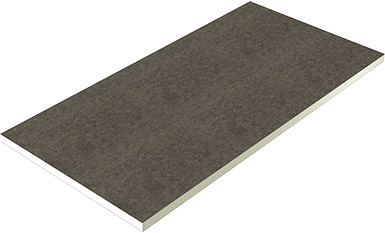

Description
Closed-cell polyisocyanurate (polyiso) foam core integrally bonded to non-asphaltic, fiber-reinforced organic felt facers. ACFoam-II is offered in a variety of thicknesses, providing long-term thermal resistance (LTTR) values from 5.7 to 26.8. Available in 4ft x 8ft (1220mm x 2440mm) and 4ft x 4ft (1220mm x 1220mm) panels. Manufactured in accordance with ASTM C1289, Type II, Class 1, Grade 2 (20 psi) or Grade 3 (25 psi) and CAN/ULC-S704 Type 2, Class 3 or Type 3, Class 3.
| 2LTTR VALUE | THICKNESS | 3RSI | FLUTE SPANABILITY | ||
|---|---|---|---|---|---|
| in | mm | in | mm | ||
| 5.7 | 1.0 | 25.4 | 1.00 | 2.625 | 66.68 |
| 8.6 | 1.5 | 38.1 | 1.50 | 4.375 | 111.13 |
| 11.4 | 2.0 | 50.8 | 2.01 | 4.375 | 111.13 |
| 14.4 | 2.5 | 63.5 | 2.53 | 4.375 | 111.13 |
| 17.4 | *3.0 | 76.2 | 3.06 | 4.375 | 111.13 |
| 20.5 | *3.5 | 88.9 | 3.60 | 4.375 | 111.13 |
| 23.6 | *4.0 | 101.6 | 4.15 | 4.375 | 111.13 |
2 LTTR (long term thermal resistance) values were determined in accordance with CAN/ULC-S770-09. Test samples were third-party selected and tested by an accredited material testing laboratory. The LTTR results were reviewed by FM Global and certified by the PIMA Quality Mark Program. 3 RSI is the metric expression of R-value (m2 • K/W).
* To minimize the effects of thermal bridging, Atlas strongly recommends the use of multiple layers when the total desired or specified R-value requires an insulation thickness greater than 2.7” thick.
Manufactured and tested for use in new and re-roofing applications. ACFoam-II is used in built-up (BUR), modified bitumen, metal, ballasted single-ply, mechanically attached single-ply and adhered single-ply roofing systems. These roofing systems depend on proper installation for successful performance. Refer to FM Approvals® RoofNav and UL Online Certifications Directory for additional application details.
| PROPERTY | TEST METHOD | RESULTS |
|---|---|---|
| DIMENSIONAL STABILITY | ASTM D2126 | < 2% |
| COMPRESSIVE STRENGTH | ASTM D1621 | 20 psi (140 kPa) or 25 psi (172 kPa) |
| WATER ABSORPTION | ASTM C209 & D2842 | < 1.5%, < 3.5% |
| WATER VAPOR TRANSMISSION | ASTM E96 | < 1.5 perm (85.5ng/(Pa•s•m2)) |
| PRODUCT DENSITY | ASTM D1622 | Nominal 2.0 pcf (32.04 kg/m3) |
| FLAME SPREAD | ASTM E84 (10 min.) | 140–60 |
| SMOKE DEVELOPMENT | ASTM E84 (10 min.) | 150–170 |
| TENSILE STRENGTH | ASTM D1623 | > 730 psf (35 kPa) |
| SERVICE TEMPERATURE | – | -100°F to +250°F |
1 Numerical ratings are not intended to reflect performance under actual fire conditions. Flame spread index of ≤75 and smoke development ≤450 meet code requirements for foam plastic roof insulation. Codes exempt foam plastic insulation when used in FM 4450 or UL 1256. Physical properties listed above are presented as typical average values as determined by accepted ASTM test methods and are subject to normal manufacturing variation.
- ASTM C1289, Type II, Class 1, Grade 2 (20 psi) or Grade 3 (25 psi)
- CAN/ULC-S704, Type 2, Class 3 or Type 3, Class 3
- CCMC No. 12464-L
- UL Certified for Canada – Insulated Roof Deck Assemblies Construction No. C38 and 52. Meet CAN/ULC-S126, CAN/ULC-S101 and CAN/ULC-S107
- UL Standard 1256 Classification Construction No. 120, 123 & 292
- UL Standard 790 (ASTM E108) Roofing Systems Classification
- UL Standard 263 (ASTM E119) Fire Resistance Classification
- UL Standard 1897 Uplift Resistance
- FM Standard 4450/4470 Approved Refer to FM Approvals® RoofNav for Specific System Details
- IBC Chapter 26 & NBC Sections on Foam Insulation
- California State Insulation Quality Standards and Title 25 Foam Flammability Criteria (License #T 1231)
- Miami-Dade County Approved
- State of Florida Product Approval (FL17989)



